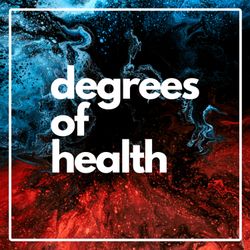Latest episode
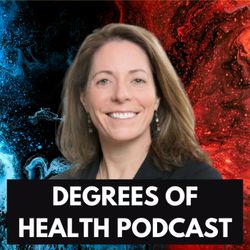
98. Cancer as a Metabolic Disease - Insulin, Keto, and Recurrence | Dr. Kristy Kessling
59:24||Ep. 98What if cancer isn’t primarily a genetic disease but a metabolic one?In this episode, Ben sits down with radiation oncologist Dr. Kristy Kessling to explore a radically different lens on cancer, one that centers on mitochondria, insulin resistance, inflammation, and the internal “terrain” of the body.Dr. Kessling explains why she believes cancer begins with mitochondrial stress not random bad luck and why insulin and IGF-1 may be more important drivers than most patients are ever told. We unpack the difference between attacking cancer cells and improving the body’s metabolic environment, and why those two approaches are not the same.Topics covered:Why “cancer is a metabolic disease” is more than just a sloganThe role of insulin, IGF-1, and glucose in tumour growthBRCA genes: why genes are not destinyThe three biomarkers Dr. Kessling prioritizes for prevention and recurrenceKetogenic and carnivore diets, what matters, and common mistakesFasting and ketosis alongside chemotherapy (and why some patients experience fewer side effects)Cancer stem cells and the importance of terrainWhy recurrence prevention mirrors prevention itselfThe overlooked role of stress, mindset, and emotional healthThis conversation challenges the conventional narrative and offers something deeply empowering the idea that metabolic health gives us more agency than we’ve been led to believe.Whether you’re navigating a diagnosis, focused on prevention, or simply interested in the intersection of metabolism and chronic disease, this episode offers a hopeful and thought-provoking perspective.Exploring the benefits of red and infra light therapy? Our community receive 10% off via this linkWant to watch this on video? Subscribe on YouTubeInstagram @degreesofhealthDisclaimer
More episodes
View all episodes
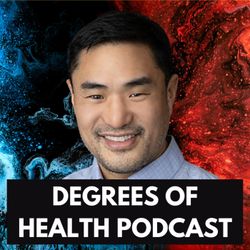
97. Breathing and Metabolism: Unraveling the Connection | Dr Jonathan Jun
25:59||Ep. 97This episode is a deep dive into physiology, sleep science, and the hidden systems shaping how we breathe.We cover:Why your body is basically a walking engine producing CO₂The real mechanism behind sleep apneaWhy two people with the same BMI can have totally different breathingHow body fat distribution affects airway functionThe surprising connection between ketosis and breathing improvementsThe study showing ketogenic diets improved CO₂ clearance in certain patientsWhether exogenous ketones could affect sleep and breathingWhy sleep science is still full of mysteries doctors can’t yet explainDr. Jun also shares what research he’d run if he had unlimited funding — and the answer could change how we treat respiratory disorders.If you’re interested in sleep, metabolism, health optimization, or physiology, this conversation will change how you think about breathing.👍 Subscribe for more expert conversations on health, performance, and human biology.Exploring the benefits of red and infra light therapy? Our community receive 10% off via this linkWant to watch this on video? Subscribe on YouTubeInstagram @degreesofhealthDisclaimer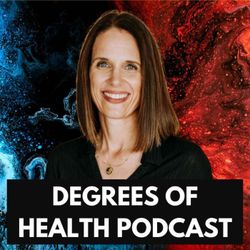
96. Secure Love Is Built, Not Found | Julie Menanno
01:18:55||Ep. 96Couples therapist and Secure Love author Julie Menanno joins Ben Hopkins to unpack what actually creates secure love and why most couples try to create change in the exact wrong way.Julie explains why validation and emotional safety open the nervous system to growth, how to “accept the person but not the behavior,” and what anxious, avoidant, and disorganized attachment can look like in real relationships.We talk about:Why anxious attachment can chase highs and comebacksWhy avoidant attachment fears failure and shuts downDisorganized attachment: unpredictability, overwhelm, and dissociationHow couples learn emotional skills in the momentWhat secure love feels like: calm, connection, and repairExploring the benefits of red and infra light therapy? Our community receive 10% off via this linkWant to watch this on video? Subscribe on YouTubeInstagram @degreesofhealthDisclaimer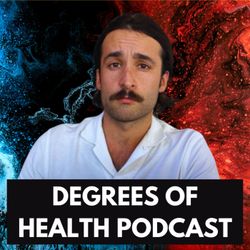
95. The Hidden Role of Light in Health, Cancer & Metabolism | Dr Max Gulhane
01:02:06||Ep. 95Are we beings of light — literally?In this episode, Ben Hopkins is joined by Dr. Max Gulhane to unpack the science of biophotons, mitochondria, circadian rhythm, and sunlight — and how light may be a core driver of metabolism, cancer risk, and chronic disease.From quantum biology to sun exposure myths, grounding, vitamin D, and ancestry-specific health, this conversation challenges modern public health narratives and asks a deeper question:What if disease isn’t just biochemical — but a light mismatch?A fascinating deep dive into the intersection of biology, evolution, and modern illness.Exploring the benefits of red and infra light therapy? Our community receive 10% off via this linkWant to watch this on video? Subscribe on YouTubeInstagram @degreesofhealthDisclaimer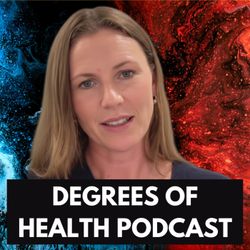
94. Are You Tired but Wired? Productive but Exhausted? | Jessica Turton
55:23||Ep. 94In this episode, Ben Hopkins is joined by dietitian Dr Jessica Turton to explore why chronic under eating may be one of the most overlooked causes of fatigue, brain fog, poor sleep and stubborn health issues.We break down how eating too little increases stress hormones, disrupts metabolism, drives nutrient deficiencies, and creates “fake energy” that keeps high performers running on empty.Ben also shares his personal experiment with eating more and why it led to better sleep, clearer thinking, and major improvements in strength and recovery.A must listen if you’re eating “healthy” but still feel awful.Exploring the benefits of red and infra light therapy? Our community receive 10% off via this linkWant to watch this on video? Subscribe on YouTubeInstagram @degreesofhealthDisclaimer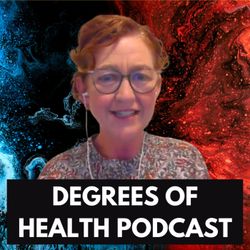
93. Oral Health as an Early Warning Sign of Metabolic Disease | Sarah Hancock
54:14||Ep. 93Is tooth decay an early warning sign of metabolic disease?In this episode, I’m joined by Dr. Sarah Hancock to explore a connection most of us were never taught the powerful link between oral health, nutrition, and long term metabolic health.Dental caries (tooth decay) is the most common diet related disease in the world yet it’s rarely discussed as part of chronic disease prevention. Sarah explains how frequent consumption of refined carbohydrates, nutrient poor diets, and early childhood eating patterns can affect not just our teeth, but our metabolism, insulin sensitivity, and future disease risk.We cover:Why cavities may be an early metabolic red flagHow diet impacts teeth beyond brushing and fluorideThe link between refined carbs, insulin resistance, and oral healthWhy poor oral health often begins in childhoodHow nutrient dense diets may protect both teeth and metabolismThis conversation reframes oral health as a whole body issue, not just a dental one.🎙️ Listen now and share with anyone interested in preventative health.Exploring the benefits of red and infra light therapy? Our community receive 10% off via this linkWant to watch this on video? Subscribe on YouTubeInstagram @degreesofhealthDisclaimer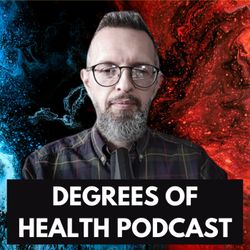
92. Is Cancer Really a Metabolic Disease or an Infection? | Mark Lintern
49:16||Ep. 92In this episode, Ben sits down with Mark Lintern to challenge that assumption and explore a radically different idea...What if cancer is a disease of suppression, not failure?Drawing on the metabolic theory, the Warburg effect, mitochondrial biology, and emerging research into the tumour microbiome, Mark lays out a compelling framework that reframes cancer as a chronic cell danger response potentially driven by persistent infection.They unpack..Why the metabolic theory explains more than genetics but still leaves gaps.Why apoptosis and immune evasion don’t fully fit the “broken cell” narrative.How mitochondria may intentionally suppress oxidative phosphorylation.Why prostate cancer breaks the Warburg rule entirely.The role of fungi, bacteria, and the tumour associated microbiome.Why immunotherapy often fails and sometimes backfires.How infection biology may explain inflammation, immune suppression, and tumour growth.What this means for real world treatment strategies, from metabolic therapy to repurposed drugs.This is a deep, systems-level conversation. Not about silver bullets but about first principles.If theory informs treatment, then getting the theory right matters.We cover:🧬 Metabolic vs somatic mutation theory🔥 The Warburg effect as a defensive response🦠 Infection, fungi, and the tumour microbiome🧠 The cell danger response model🫁 Oxygen, mitochondria, and immune signalling🧪 Prostate cancer as a metabolic outlier💊 Repurposed drugs, antifungals, and metabolic therapies🌱 Why cancer may be adaptive — not defectiveThis episode isn’t about certainty.It’s about asking better questions.Exploring the benefits of red and infra light therapy? Our community receive 10% off via this linkWant to watch this on video? Subscribe on YouTubeInstagram @degreesofhealthDisclaimer
